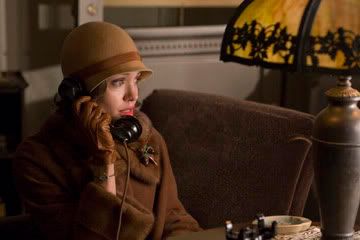Changeling (2008)


On March 9, 1928 in Los Angeles, the son of Christine Collins (Angelina Jolie) went missing. The worried mother contacted the police, and a fruitless search ensued for her son, Walter. Months later, the LAPD announced they had found her son alive in DeKalb, Illinois. When reunited with her son, she claimed the boy brought to her was not him. The police force, who was under fire for corruption, insisted that Collins must be mistaken. Standing before the press, Capt. J.J. Jones (Jeffrey Donovan) assured Collins that the boy was her son and stated the case as a superior example of the LAPD's hard work. The LAPD was in dire need of such positive coverage and continued to ignore Collins' assertions that her real son was still missing and the boy she was forced to take care of wasn't Walter. Collins was then claimed as mentally insane and locked up in a psychiatric ward.
Clint Eastwood's "Changeling" focuses on the factual retelling of this true story. It all begins as a simple case of a missing boy and explodes into an entire critique of the structure of Los Angeles in the 1920s including the LAPD, status and rights of women, and treatment of the mentally unstable. After "Mystic River," "Million Dollar Baby," and then the duo of "Flags of Our Fathers" and "Letters from Iwo Jima," it appears Eastwood is only gaining steam and at the peak of his creative abilities. Because this real life event happened so long ago and because it's simply something sad that happened to somebody, it's amazing how Eastwood was able to craft such a powerful and disturbing drama out of it. It's not the history that makes the movie important, but rather, the stylistic abilities behind the storytelling that makes the history so important. Eastwood is a strong force, and watching this movie is watching a master at work doing what he does best. Walking out of it, there's the immense satisfaction of just having watched something so well-made.
There's a certain look to the entire movie as a period piece, and the scenery is glossed over in beauty with certain colors popping out. An entire world is created, and it's like viewing this time period as we've never seen it before; the movie initially starts in black and white and fades back into it at the end. It's a sly stylistic approach, and it works wonders. It's visually appealing, and there are so many details relating to the time period to notice throughout. And not to mention Eastwood's subtle but deeply resonant musical score. The entire film acts as an observation within this vividly realized world, an observation that makes us angry, very angry. The story is the unraveling and unwinding of such anger that leads to somber resolve.
Christine Collins receives aid from a radio preacher named Rev. Gustav Briegleb (John Malkovich) who seeks out to uncover the unlawfulness of the LAPD. Meanwhile, a detective is put on a seemingly insignificant case that leads to the discovery of the murder of 20 young boys on an isolated ranch in Winesville, California. This discovery takes the fight in a whole new direction. The film has a sense of very traditional storytelling while at the same time remaining complex and morally challenging, focusing on the essential and fragile hope of having any sort of decency in the world we know. The structure is fascinating as the movie starts off intimately personal and then zooms out to a nearly epic sweep and tightens right back in again to the individual. The story should really be left for viewers to discover on their own, and so I must refrain from giving too much away. For such a heart-wrenchingly sad saga, the movie is equally exhilarating.
Angelina Jolie is inspired casting. Donning bright red lipstick, she sustains an assured presence building in terror and anger and ending in silent resolution, all which brings the LAPD crumbling to the ground. She, however, never takes center stage and simply delivers what she is good at, right alongside John Malkovich who perfectly fits his role as the crusading minister. Geoff Pierson as the lawyer who takes Collins' case to court is a demanding presence, as well. And not to be overlooked is Jason Butler Harner's haunting role as the frightened remnants of a man turned murderer, Gordon Northcott. Amy Ryan absolutely nails her brief number of scenes as Collins' fellow psycho-ward inmate. Surprisingly impressive, as well, is Eddie Alderson who plays the 15-year-old nephew of the killer; his account of the grisly murders is harrowing. "Changeling" is another triumph from a very accomplished filmmaker. It's a film to discuss, remember, and admire, and it's among the best of the year.





No comments:
Post a Comment